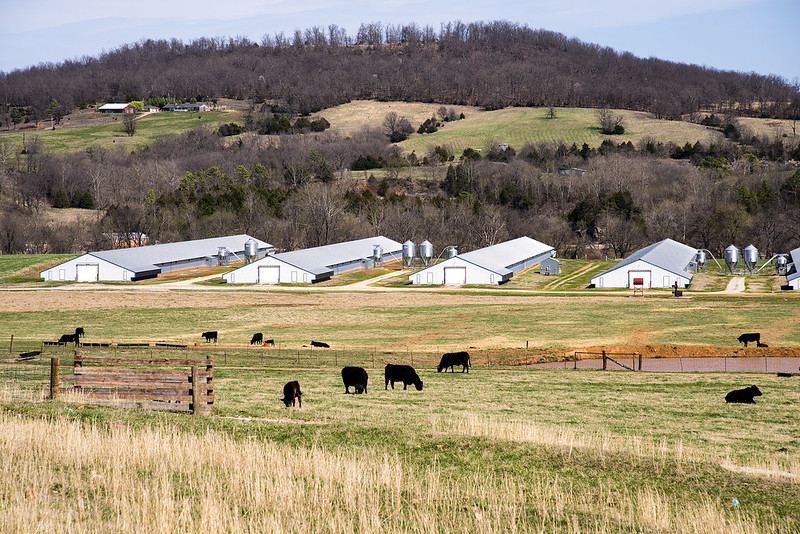June 4, 2020
Arkansas’ beef processors face labor, marketing challenges, study finds
By Mary Hightower
U of A System Division of Agriculture
Fast facts
- Marketing, finding labor challenges Arkansas meat processors
- Survey finds growing interest in supporting local beef processors
- Survey commissioned by Arkansas Beef Council
(711 words)
(Download this story in MS Word format here.)
LITTLE ROCK – Marketing and finding labor are among challenges facing the state’s beef processors, according to a study from the Public Policy Center of the University of Arkansas System Division of Agriculture.
The study was commissioned by the Arkansas Beef Council to examine retail beef production practices in the state. The survey launched in January included questions about wait time and capacity for serving small producers selling beef locally in Arkansas.
Kristin Higgins, extension program associate with the Public Policy Center, said that key findings included:
- Operators of facilities that are not under inspection by the U.S. Department of Agriculture, are content with their current business model.
- However, there is interest in those processors growing their businesses either to support more producers selling locally or to add a retail component to their own businesses.
The survey was part of a project that also intended to provide an overview of program policies and costs in states that maintain a state-level inspection program.
Custom processing
Arkansas relies on the USDA to inspect beef for retail sale. As of May 2020, the USDA's
Food Safety and Inspection directory (https://bit.ly/3gziRhN) listed three Arkansas businesses with having USDA inspectors for beef. A number
of processing facilities in the state offer custom-exempt services. Meat processed
under the custom-exempt process is not USDA inspected so it can't be sold in stores
or across state lines. Examples include processing beef grown on a family’s ranch
and processed for the family to use, or cattle sold through local food networks for
private use.
“Among producers there is an assumption that there are not enough slaughterhouses and processing facilities in Arkansas that cater to small-scale producers to support consumption of local beef,” Higgins said. “It’s a circular paradox. Not enough slaughterhouses to support producers, but not enough producers to support slaughterhouses.”
COVID prompts changes
The issue of custom processing has come to the fore with the advent of the COVID-19
pandemic. Since the survey was conducted, the pandemic has disrupted the industry
with consumer panic-buying and meat processing interruptions.
“Demand for beef has increased since March, resulting in producers reporting longer wait times for an appointment for slaughter and processing. Prices have also increased since then,” Higgins said.
“The release of this study comes at a time when interest in locally procured meats is likely at an all-time high,” Travis Justice, administrator of the Arkansas Beef Council, said. “COVID-related issues have caused major disruptions within traditional meat processing and distribution sectors.
“Interest in locally-sourced foods has been gaining momentum in recent years; and with the current pandemic has created a boom in demand for these type products,” he said.
The National Agricultural Law Center, part of the Division of Agriculture, recently hosted a webinar focused on custom processing. The webinar was recorded and can be viewed at https://uaag.adobeconnect.com/pe3378pm4cdf/?proto=true. The center has also compiled nationwide laws on meat processing, available at https://nationalaglawcenter.org/state-compilations/meatprocessing/.
Higgins offered a caveat that the survey was something of a snapshot, and “provides a point-in-time view” of the state’s pre-pandemic status.
Other findings
A dozen facilities provided estimates of the amount of meat processed in 2019, totaling
2.8 million pounds. The study notes that the numbers were estimates and not provided
from paperwork. The estimate also differs from data reported by the National Agricultural
Statistics Service.
Six facilities noted difficulty in finding and retaining employees because slaughterhouse jobs are physically demanding. Nearly all the facilities said their employees learned the trade on the job, though several had longtime experienced workers who came to them from other slaughterhouses.
Survey participants said marketing was a twofold problem. First was making the public aware that local beef is a viable alternative to buying meat at the grocery store. The second was being able to market their services to potential producers.
“The study clearly identifies the major challenges faced by local processors,” Justice said. “It also pinpoints those areas that need further attention if the local processor sector is to expand.”
Methodology
Twenty-six facilities were invited to participate in the survey between January and
March 2020. Fourteen facilities chose to participate in the survey, a response rate
of 54 percent.
The survey was conducted from January to March 2020.
To learn about extension programs in Arkansas, contact your local Cooperative Extension Service agent or visit www.uaex.uada.edu. Follow us on Twitter at @AR_Extension.
About the Division of Agriculture
The University of Arkansas System Division of Agriculture’s mission is to strengthen agriculture, communities, and families by connecting trusted research to the adoption of best practices. Through the Agricultural Experiment Station and the Cooperative Extension Service, the Division of Agriculture conducts research and extension work within the nation’s historic land grant education system.
The Division of Agriculture is one of 20 entities within the University of Arkansas System. It has offices in all 75 counties in Arkansas and faculty on five system campuses.
Pursuant to 7 CFR § 15.3, the University of Arkansas System Division of Agriculture offers all its Extension and Research programs and services (including employment) without regard to race, color, sex, national origin, religion, age, disability, marital or veteran status, genetic information, sexual preference, pregnancy or any other legally protected status, and is an equal opportunity institution.
# # #
Media Contact: Mary Hightower
Chief Communications Officer
University of Arkansas System Division of Agriculture
mhightower@uada.edu
501-671-2006
